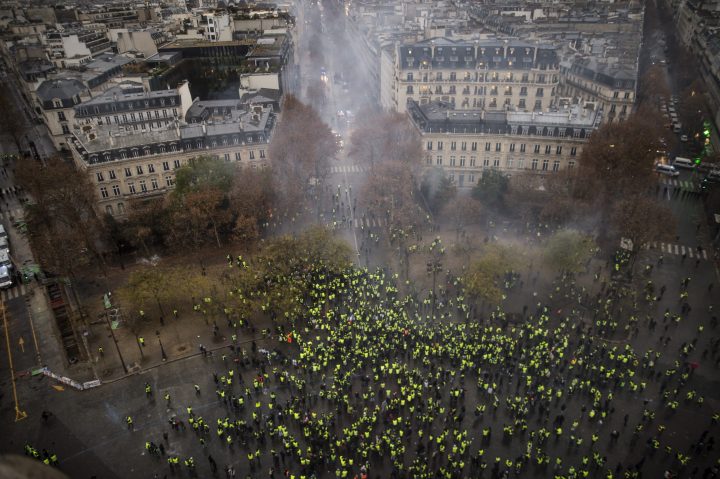French President Emmanuel Macron returned home from the G20 summit Sunday to find Paris engulfed in chaos, amid the largest protest to hit the city in a decade and the third in as many weeks.

Thousands of people rioted in the streets of France’s capital over the weekend, many of them wearing reflective yellow vests as they torched cars, looted stores and tagged the iconic Arc de Triomphe with graffiti declaring: “The yellow vests will triumph.”
Smaller protests continued into Monday.
The nationwide protests have been escalating since Nov. 17, amid growing anger over rising fuel taxes and the high cost of living. The protests have already started taking a toll on the French economy, with hotel reservations dipping, retailers reporting lower sales and some gas stations running out of fuel because resupply trucks can’t get past protester blockades.
“The impact is severe and ongoing,” France’s Finance Minister Bruno Le Maire said on Monday.
WATCH BELOW: Protests turn France into a battle zone

Police say at least 110 people, including 20 officers, were injured and 224 individuals were arrested over the weekend. They estimated 75,000 protesters hit the streets across France on Saturday, including 5,500 in Paris.
President Macron promised on Sunday that those who attacked police will be “held responsible for their acts.” He vowed to meet with his critics, but did not back down from his stance on the fuel taxes.
Three people have died and hundreds have been injured since the protests started.
Who are the ‘yellow vest’ protesters?
The “yellow vest” movement started online as a grassroots rebellion against higher fuel prices, but it has morphed into a wide-ranging outlet for middle-class anger over the high cost of living. It reportedly cuts across different age groups and geographical regions, although it’s primarily composed of blue-collar workers living outside big cities.
WATCH BELOW: November riots involving ‘yellow vest’ protesters in France
It has no single leader or slant on the political spectrum, and appears to include members from the far-right and the far-left, police say.
Their uniforms are the yellow vests that French citizens don when their vehicles have broken down at the side of the road — a symbolic outfit meant to show that they are motorists in distress.
French paramedics and students joined the anti-government rallies on Monday. Ambulances blocked a bridge leading to the National Assembly and students blocked dozens of high schools across the country, according to French media reports.
WATCH BELOW: Ambulance drivers blockade route in Paris amid protests

Seven in 10 French citizens support the “yellow vests,” according to a Harris Interactive opinion poll conducted after Saturday’s riots. Copycat protesters have also emerged in Belgium, Germany and the Netherlands.
Macron has met with his opponents in government, but the yellow vests have not put forward a leader of their own to discuss their demands.
What are they protesting against?
Macron’s government has imposed several climate change-related fuel taxes in recent months — including another slated to take effect in January. Macron says the taxes are meant to encourage drivers to exchange diesel-fuelled vehicles for more environmentally-friendly models, but many middle-class French citizens say the taxes are squeezing them to the breaking point.
The price of diesel in France has gone up by about 20 per cent over the past year to approximately 1.49 euros (CAD$2.23) per litre, according to the website Carbu. Global oil prices have also crept up over the last year.
The price of fuel is slated to increase by approximately 0.03 euros per litre of gas, and 0.06 euros cents per litre of diesel, under the new French taxes coming into effect on Jan. 1.
The “yellow vest” protesters want Macron to freeze all planned taxes on fuel. Many have also called for him to resign.
WATCH BELOW: Violent protests stretch into the night on Nov. 24

Macron vowed last week to stick to his planned fuel taxes, which are part of France’s efforts to meet the targets it set under the 2015 Paris climate agreement.
Marcon promised to make the environment a priority when he was elected 18 months ago, but his tax policies have alienated many in the middle class.
“Clearly, countries where inequalities are the highest are the ones where these kinds of pushbacks are most likely,” Francois Gemenne, a specialist in geopolitics at SciencesPo University in Paris, told Reuters.
Gemenne says environmental policies have already generated heavy backlash in other countries such as Italy, the United States and Britain. “I guess it’s one of the reasons why populist leaders tend to be very skeptical about climate change and environmental measures,” he said.
WATCH BELOW: Trump denies U.S. climate report predicting dire economic consequences

Prime Minister Justin Trudeau‘s pro-environment policies have generated mixed responses across Canada. Some provinces, such as B.C., have embraced a tax on carbon, while others have railed against it.
In Ontario, for instance, voters booted out the provincial Liberals and elected a Progressive Conservative government under Doug Ford, who vowed to fight Trudeau’s proposed federal carbon tax. Ford also scrapped Ontario’s cap-and-trade program for carbon emissions.
Trudeau says 90 per cent of the revenue from his federal carbon tax will be redistributed to taxpayers.
Macron has pledged to use most of the money generated from his climate-change policies to tackle the national debt. His critics have accused him of being a president of the rich, after he cut taxes on wealthy companies in his first year in office, while reducing housing benefits and increasing social security levies.
WATCH BELOW: Macron visits damaged Arc de Triomphe after riot

Macron’s government expects to reduce the overall tax burden to 44.2 per cent of the national income next year, according to its 2019 budget released in September.
French citizens paid the highest tax compared to gross domestic product (GDP) in the European Union last year, at a rate of 48.4 per cent, according to data from the European Commission.
— With files from Reuters and the Associated Press











Comments